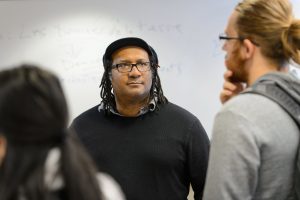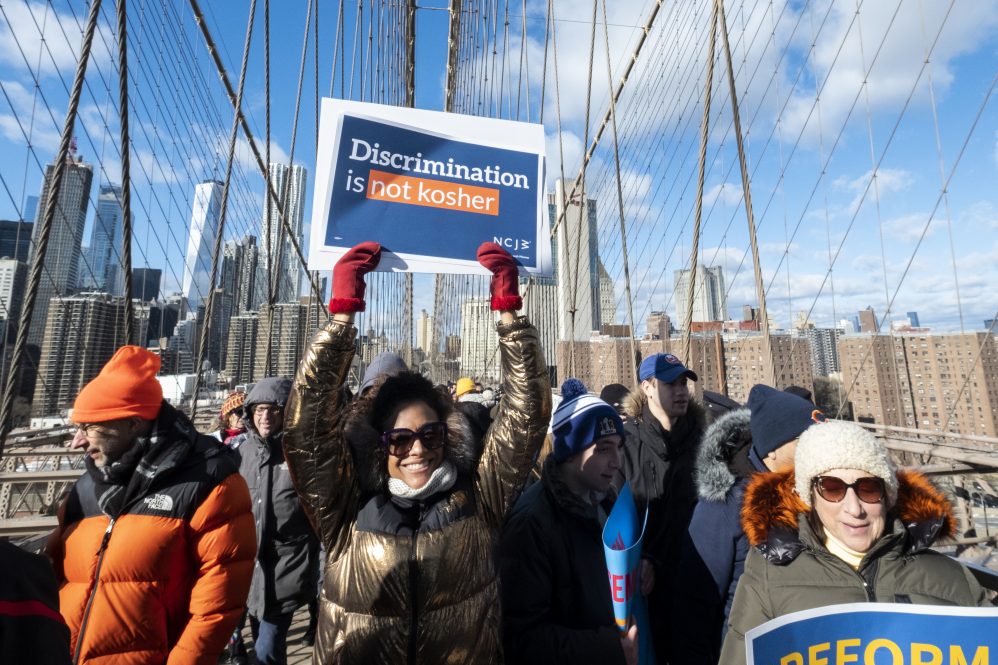Antisemitism is embedded with presuppositions about Jewish people, according to Lewis Gordon, the Board of Trustees Distinguished Professor of Philosophy and Global Affairs and head of the Department of Philosophy at UConn.
“In the U.S. context, people just presume Jews as white, for instance,” Gordon explains, “and Jews are a diverse population.”
There are Jewish queer people, Jewish trans people, Jewish Black and brown people, Jewish women, Jewish men, and much more – the list is long, according to Gordon, who has worked in academia for 40 years and has long studied the complexity and social dimensions of race and racism.

But that doesn’t stop the stereotypes – and the hate that often comes with them.
“For some people, it’s easier for them to hate us if they imagine we’re white, and for some people, it’s easier to hate us if they imagine we’re not white,” says Gordon, who is Black and Jewish. “You lose either way.”
What’s important, Gordon says, is for the communities that are subject to these stereotypes to engage in constructive conversation about their commonalities, their differences, and the intersectionalities that all members of diverse Jewish identities face as they navigate the challenges of antisemitism – and to break down the often-distorted discussions around antisemitism that seek to dehumanize and divide.
“There are antisemitism and anti-Black racism, but that’s not all we’re about,” he says. “We’re also about our humanity.”
Gordon hopes to engage UConn and a broader community in that conversation about shared and diverse humanity starting with a two-day conference on April 29 and 30 in the Konover Auditorium at The Dodd Center for Human Rights in Storrs, where the University will host more than a dozen Black and Jewish scholars from around the country and across the globe.
Co-convened by Gordon and by Adane Zawdu Gebyanesh ’19 Ph.D., a cultural sociologist and postdoctoral fellow at the Polonsky Academy for Advanced Study in the Humanities and Social Sciences at the Van Leer Institute in Jerusalem, the event will center the panelists’ shared ground and offer insights for the general academic community and the public.
From antiracist strategies to combat global antisemitism, to antisemitism and genocide in sub-Saharan Africa, to the development of Ethiopian feminism in Israel, the convenors hope the conference will bring a strong focus on co-learning and productive discussion.
“We’re going to present our work to the public,” says Gordon, “but among one another, we’re going to discuss what can grow organically out of this group.”
Like Gordon and Gebyanesh, the participating scholars are also multigenerational, as diversity of age is another important aspect of the conversation, explains Gordon.
“My hope for the younger generation, as they ascend, is for the older generation to become a supporting cast rather than functioning as the gatekeepers,” he says, and the conference actually began informally on Monday, April 28, with community conversations at UConn, including a lunchtime discussion with UConn Hillel, where individuals from those diverse Jewish identities didn’t always agree but did so productively.
“It was just such a powerful, beautiful meeting of our students, in conversation with these scholars,” says Gordon. “We have some amazing students here. But it was such a moving, rich, nakedly raw, truthful conversation, which is what’s been missing from a lot of these [discussions], and it was powerful to see people also disagree constructively.”
Members of the UConn community and the public are encouraged to visit The Dodd Center on Tuesday and Wednesday to take part in this conversation. The event will also be livestreamed.
The event is cosponsored by UConn’s Africana Studies Institute; the Antisemitism Lab; the Center for Judaic Studies and Contemporary Jewish Life; the CLAS Dean’s Office, Department of Literatures, Cultures, and Languages, and Department of Sociology; the Gladstein Family Human Rights Institute; the H. Fred Simons African American Cultural Center; the UConn Office for Diversity and Inclusion; Philosophy and Global Affairs; UConn Global Affairs; UConn Hillel; and the UConn Humanities Institute.
For more information about this two-day conversation, please visit philosophy.global.uconn.edu.



